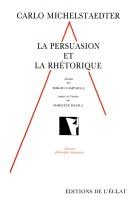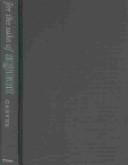| Listing 1 - 10 of 20 | << page >> |
Sort by
|
Book
ISBN: 2745308092 Year: 2004 Volume: 22 Publisher: Paris : H. Champion,
Abstract | Keywords | Export | Availability | Bookmark
 Loading...
Loading...Choose an application
- Reference Manager
- EndNote
- RefWorks (Direct export to RefWorks)
Rhétorique --- Éloquence --- Persuasion (rhétorique) --- Ouvrages avant 1800 --- Ouvrages avant 1800.
Book
ISBN: 2130390080 9782130390084 Year: 1985 Volume: 2238 Publisher: Paris : PUF - Presses Universitaires de France,
Abstract | Keywords | Export | Availability | Bookmark
 Loading...
Loading...Choose an application
- Reference Manager
- EndNote
- RefWorks (Direct export to RefWorks)
Logic --- Psycholinguistics --- Persuasion (Psychology) --- Persuasion (Psychologie) --- Persuasion (Rhetoric) --- History --- History. --- Persuasion. --- Overreding. --- Persuasion (psychologie) --- Persuasion (rhetorique)

ISBN: 0199263469 0191514101 Year: 2003 Volume: *28
Abstract | Keywords | Export | Availability | Bookmark
 Loading...
Loading...Choose an application
- Reference Manager
- EndNote
- RefWorks (Direct export to RefWorks)
Persuasion (Rhetoric) --- Persuasion (Rhétorique) --- Early works to 1800. --- Ouvrages avant 1800 --- Cicero, Marcus Tullius. --- Persuasion (Rhétorique) --- Forensics (Public speaking) --- Oratory --- Rhetoric --- Early works to 1800

ISBN: 2905372362 9782905372369 Year: 1989 Volume: 13 Publisher: Combas : Éditions de l'Éclat,
Abstract | Keywords | Export | Availability | Bookmark
 Loading...
Loading...Choose an application
- Reference Manager
- EndNote
- RefWorks (Direct export to RefWorks)
Rhetoric --- Persuasion (Rhetoric) --- Rhétorique --- Argumentation --- Rhétorique. --- Persuasion (Rhétorique) --- Rhétorique --- Overtuigen (Retorica) --- Retorica --- CDL --- 1 --- Rhétorique antique. --- Persuasion (rhétorique). --- Philosophie et rhétorique. --- Objectivité.
Book

ISBN: 3110757257 9783110757255 9783110757156 Year: 2021 Publisher: Berlin Boston
Abstract | Keywords | Export | Availability | Bookmark
 Loading...
Loading...Choose an application
- Reference Manager
- EndNote
- RefWorks (Direct export to RefWorks)
Bridging theoretical modelling and advanced empirical techniques is a central aim of current linguistic research. The progress in empirical methods contributes to the precise estimation of the properties of linguistic data and promises new ways for justifying theoretical models and testing their implications. The contributions to the present collective volume take up this challenge and focus on the relevance of empirical results achieved through up-to-date methodology for the theoretical analysis and modelling of argument structure. They tackle issues of argument structure from different perspectives addressing questions related to diverse verb types (unaccusatives, unergatives, (di)transitives, psych verbs), morpho-syntactic operations (prefixation, simple vs. particle verbs), case distinctions (dative vs. accusative, case vs. prepositions), argument and voice alternations (dative vs. benefactive alternation, active vs. passive), word order alternations and the impact of animacy, agentivity, and eventivity on argument structure. The volume will be of interest to theoretical linguists, psycholinguists, and corpus linguists interested in the syntax of argument structure and its modelling using precise empirical methods.
LANGUAGE ARTS & DISCIPLINES / Linguistics / Syntax. --- Argument Alternations. --- Arrgument Structure. --- Voice, Case. --- E-books --- Persuasion (Rhetoric) --- Grammar, Comparative and general --- Syntax. --- Persuasion (rhétorique) --- Syntaxe. --- Linguistics --- Research. --- Persuasion (rhétorique)
Book
ISSN: 07794614 ISBN: 2804133265 9782804133269 Year: 2000 Volume: *24 Publisher: Bruxelles : De Boeck Université,
Abstract | Keywords | Export | Availability | Bookmark
 Loading...
Loading...Choose an application
- Reference Manager
- EndNote
- RefWorks (Direct export to RefWorks)
Une méthode pour maîtriser davantage l'exposé oral ou écrit. Les auteurs, se fondant sur la pratique de la nouvelle rhétorique, offrent des outils qui exercent les aptitudes au débat et à la discussion, développent l'esprit critique et consolident la capacité à élaborer un texte, un article, un discours structuré.
Argumentation --- Argumenteren --- Francais (Langue) --- French language --- Debates and debating --- Discourse analysis, Narrative --- Rhetorique --- Rhetoric --- Discours argumentatif --- Francais (Langue) - Rhetorique - Problemes et exercices --- French language - Rhetoric --- French language - Rhetoric - Problems, exercises, etc. --- Discourse analysis, Narrative - Problems, exercises, etc. --- Persuasion (rhetorique)

Abstract | Keywords | Export | Availability | Bookmark
 Loading...
Loading...Choose an application
- Reference Manager
- EndNote
- RefWorks (Direct export to RefWorks)
Argumentatieleer --- Argumentation [Théorie de l' ] --- Belief and doubt --- Croyance (Philosophie) --- Croyance (Psychologie) --- Croyance et doute --- Doute --- Doute méthodique --- Ethics --- Ethiek --- Ethique --- Geloof en twijfel --- Overtuigen (Retorica) --- Persuasion (Rhetoric) --- Persuasion (Rhétorique) --- Raisonnement --- Reasoning --- Redenering --- Belief and doubt. --- Ethics. --- Reasoning. --- Persuasion (Rhetoric).
Book
ISBN: 2100014803 9782100014804 Year: 1993 Publisher: Paris Dunod
Abstract | Keywords | Export | Availability | Bookmark
 Loading...
Loading...Choose an application
- Reference Manager
- EndNote
- RefWorks (Direct export to RefWorks)
Logic --- Literary rhetorics --- retoriek --- Argumentatie (Debatten en debatteren) --- Argumentation (Debates and debating) --- Argumentation (Débats et discussions) --- Debates and debating --- Debatten en debatteren --- Débats et controverses --- Débats et discussions --- Overtuigen (Retorica) --- Persuasion (Rhetoric) --- Persuasion (Rhétorique) --- Speading --- Rhetoric --- Forensics (Public speaking) --- Rhétorique --- Argumentation --- Rhétorique. --- Argumentation. --- Figures de rhetorique. --- 82.085 --- Retorica. Argumentatieleer. Voordrachtkunst --- 82.085 Retorica. Argumentatieleer. Voordrachtkunst --- Rhétorique

ISBN: 1555408796 Year: 1993 Volume: 31 Publisher: Atlanta Scholars Press
Abstract | Keywords | Export | Availability | Bookmark
 Loading...
Loading...Choose an application
- Reference Manager
- EndNote
- RefWorks (Direct export to RefWorks)
Ancient rhetoric --- Antieke retoriek --- Genres [Letterkundige ] --- Genres [Literaire ] --- Genres littéraires --- Letterkundige genres --- Literaire genres --- Literary form --- Overtuigen (Retorica) --- Persuasion (Rhetoric) --- Persuasion (Rhétorique) --- Retoriek [Antieke ] --- Retoriek van de Oudheid --- Rhetoric [Ancient ] --- Rhétorique ancienne --- Rhétorique de l'Antiquité --- Rhetoric, Ancient. --- Speeches, addresses, etc., Latin --- History --- History and criticism. --- Cicero, Marcus Tullius. --- Persuasion (Rhetoric). --- Cicero, Marcus Tullius --- Speeches, addresses, etc. [Latin ] --- History and criticism
Book
ISBN: 9789027233509 9027233500 Year: 2013 Volume: 15 Publisher: Amsterdam ; Philadelphia : John Benjamins Publishing Company,
Abstract | Keywords | Export | Availability | Bookmark
 Loading...
Loading...Choose an application
- Reference Manager
- EndNote
- RefWorks (Direct export to RefWorks)
By taking an interdisciplinary approach -- with methods drawn from narratology, aesthetics, social psychology, education, and the empirical study of literature -- The Art of Sympathy in Fiction will interest scholars in a variety of fields. Its focus is the sympathetic effects of stories, and the possible ways these feelings can contribute to what has been called the "moral imagination." Part I examines the dynamics of readers' beliefs regarding fictional characters and the influence of those impressions on the emotions that readers experience. The book then turns its attention to sympathy, providing a comprehensive definition and considering the ways in which it operates in life and in literature. Part I concludes with a discussion of the narratological and rhetorical features of fictional narratives that theoretically elicit sympathy in readers. Part II applies these theories to four stories that persuade readers to sympathize with characters who seem unsympathetic. Finally, based on empirical findings from the responses of adolescent readers, Part III considers pedagogical approaches that can help students reflect on emotional experiences that result from reading fiction.
American fiction --- Sympathy in literature --- Literature and morals --- Books and reading --- History and criticism --- Littérature américaine --- Empathie (esthétique) --- Persuasion (rhétorique) --- Histoire et critique. --- Sympathy in literature. --- Literature and morals. --- Books and reading. --- History and criticism. --- Littérature américaine --- Empathie (esthétique) --- Persuasion (rhétorique)
| Listing 1 - 10 of 20 | << page >> |
Sort by
|

 Search
Search Feedback
Feedback About UniCat
About UniCat  Help
Help News
News